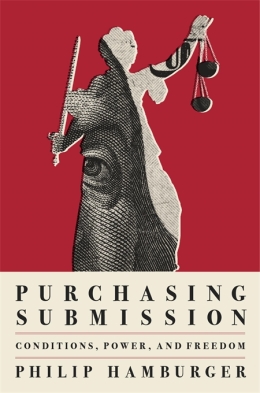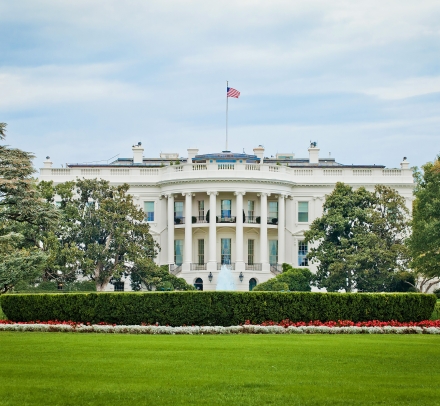
Philip Hamburger
- Maurice & Hilda Friedman Professor of Law
J.D., Yale Law School, 1982
B.A., Princeton University, 1979
Constitutional Law
First Amendment
Administrative Power
Legal History

J.D., Yale Law School, 1982
B.A., Princeton University, 1979
Constitutional Law
First Amendment
Administrative Power
Legal History
A leading scholar of constitutional law and its history, Philip Hamburger has transformed contemporary understandings of free speech, religious liberty, judicial duty, and the administrative state. His ideas have led the Supreme Court to overturn Chevron deference, restore jury rights, and curb administrative power.
In his path-breaking Separation of Church and State (Harvard 2002), Hamburger dismantles the myth that the First Amendment mandates the separation of church and state. Drawing on deep historical research, he reveals that the notion of separation flourished in nativist and theologically liberal assaults on Catholicism and other orthodoxies. In the twentieth century, this sort of theological prejudice, prominently pursued by the Ku Klux Klan, introduced separationism into constitutional doctrine.
Hamburger’s magisterial Law and Judicial Duty (Harvard 2008), based on his exploration of early state archives, shows that “judicial review” has been misconceived. Contrary to the conventional narrative—that it was a judicially created power established in 1803 by Marbury v. Madison (1803)—Hamburger shows that judicial decisions holding government acts unconstitutional developed much earlier as part of a judge’s office or regular duty to exercise independent judgment in accord with the law of the land. The judges’ most extraordinary decisions stem from their ordinary duty, not a special power.
His insight about the judges’ duty of independent judgment underlay the Supreme Court’s 2024 decision in Loper Bright Enterprises v. Raimondo, which repudiated Chevron deference and reclaimed the judges’ independence in interpreting statutes.
With Purchasing Submission: Conditions, Power, and Freedom (Harvard 2021), Hamburger exposes the perils of conditions tied to government benefits. Such conditions can infringe constitutional rights and even can operate as a stealth mode of regulation, letting government bypass elective self-government by purchasing compliance.
Hamburger ignited the modern debate about the administrative state in Is Administrative Law Unlawful? (Chicago 2014). His book observes that, like the old royal prerogative power, administrative power circumvents the regular pathways for legislation and justice. The U.S. Constitution foreclosed such evasions by requiring binding laws to be made by Congress and binding adjudications to be made by the courts. These barriers to administrative power, however, have been largely forgotten. In The Administrative Threat (Encounter 2017), Hamburger adds that administrative power is the nation’s most serious danger for civil liberties.
Translating his scholarship into action, Professor Hamburger in 2017 founded the New Civil Liberties Alliance (NCLA) to defend constitutional freedoms from administrative misconduct. The NCLA has emerged as a prominent civil rights organization, leading the struggle to defeat administrative threats to free speech, due process, and other constitutional liberties. The NCLA has led the Supreme Court to reconsider delegation (Gundy v. United States), to secure access to Article III courts (Axon v. FTC and SEC v. Cochran), and to eliminate Chevron deference (Loper Bright and Relentless v. Department of Commerce).
Hamburger’s articles pursue similar themes. In Liberality (Texas L. Rev. 2000), he traces the eighteenth-century beginnings of English and American liberal thought. More Is Less (Va. L. Rev. 2004) highlights the tension between the substance of a right and access to it, observing that the expansion of either tends to result in pressure for diminishing the other. Inversion of Rights and Power (Buff. L. Rev. 2015) protests that the compelling-government-interest test and other judicial measures of rights subject rights to considerations of power. In Courting Censorship (J. of Free Speech L. 2024), he warns that the Supreme Court has weakened speech doctrine to the point of inviting government censorship.
More broadly, The Constitution’s Accommodation of Social Change (Mich. L. Rev. 1989) shows that the Founders did not want a judicially malleable constitutional law but, instead, repeatedly sought a “permanent” constitution, mostly by excising limitations that were apt to become obsolete. Hamburger’s Nondelegation Blues (G.W. L. Rev. 2023) shows that the Framers expressly repudiated any congressional delegation of power and that the Constitution’s text thrice rejects the delegation of legislative power.
After teaching at the University of Chicago, Hamburger moved to Columbia Law School. He founded the school’s Galileo Center to champion free speech and academic freedom. He also co-founded and co-chairs the Columbia Academic Freedom Council, which in 2025 honored 30 scholars with Academic Freedom Awards for their commitment to freedom of speech.
Hamburger’s contributions have earned him more than a half-dozen prizes, including the Hayek Book Prize, the Bradley Prize, and the Barry Prize for Distinguished Academic Achievement. He is a member of the American Academy of Sciences and Letters and the American Academy of Arts and Sciences.

The federal government increasingly regulates by using money and other benefits to induce private parties and states to submit to its conditions. It thereby enjoys a formidable power, which sidesteps a wide range of constitutional and political limits.
Conditions are conventionally understood as a somewhat technical problem of “unconstitutional conditions”—those that threaten constitutional rights—but at stake is something much broader and more interesting. With a growing ability to offer vast sums of money and invaluable privileges such as licenses and reduced sentences, the federal government increasingly regulates by placing conditions on its generosity. In this way, it departs not only from the Constitution’s rights but also from its avenues of binding power, thereby securing submission to conditions that regulate, that defeat state laws, that commandeer and reconfigure state governments, that extort, and even that turn private and state institutions into regulatory agents.
The problem is expansive, including almost the full range of governance. Conditions need to be recognized as a new mode of power—an irregular pathway—by which government induces Americans to submit to a wide range of unconstitutional arrangements. Purchasing Submission explores the danger in depth and suggests how it can be redressed with familiar and practicable legal tools.

Columbia Law professors share analysis and commentary.